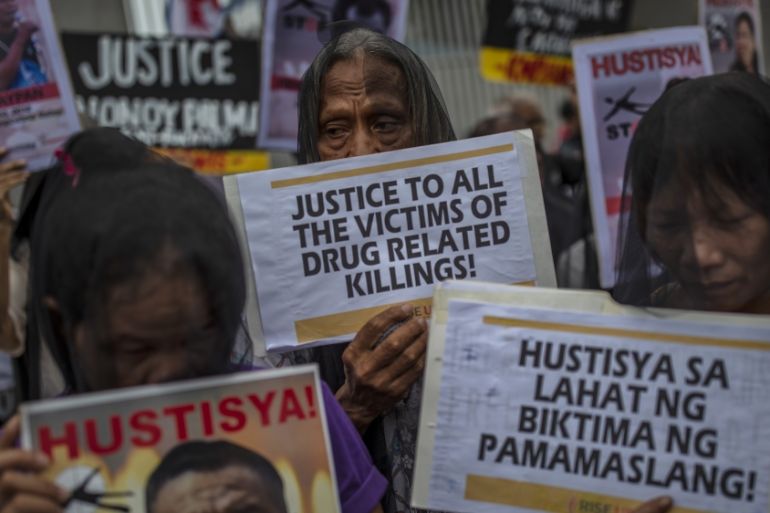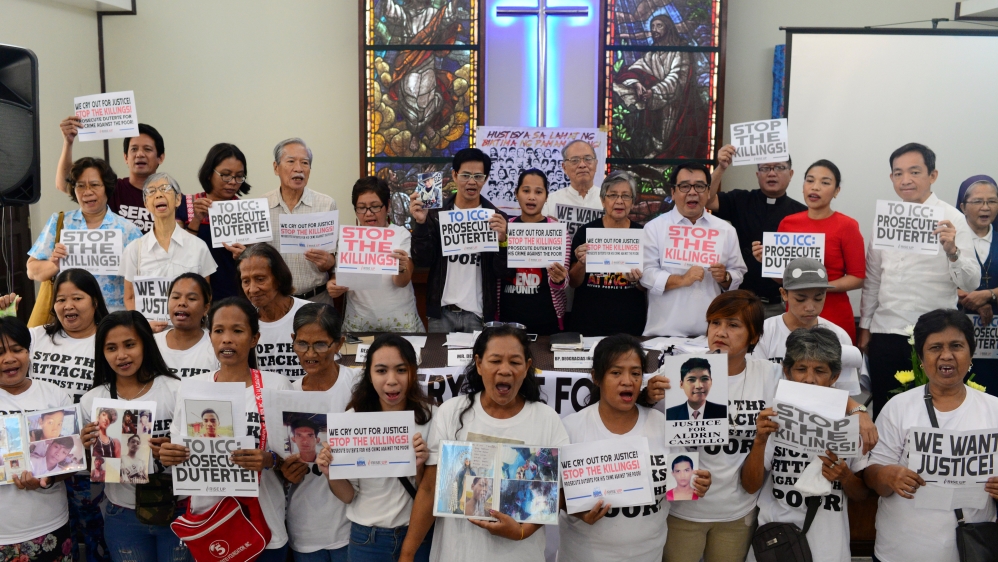Philippine authorities contradict own death toll in drugs war
New toll of 5,526 is much lower than the 6,600 police previously said had been killed in Duterte’s three-year campaign.

Mindanao, Philippines – Authorities in the Philippines have been accused of manipulating official data after publishing conflicting figures on the number of people killed during President Rodrigo Duterte‘s three-year so-called “war on drugs”.
Government officials said on Thursday the number of people killed in the widely condemned campaign stood at 5,526 as of June 30.
Keep reading
list of 4 itemsPhilippine human rights campaigner granted bail
Families urge Philippines to work with ICC on ‘drug war’ probe
Philippine police officer jailed for killing teens in ‘drug war’
The count – issued at a news conference lauding the latest “accomplishments” in Duterte’s anti-drug push in the capital, Manila – is much lower than previous figures published by the government.
A police report in June set the death toll as of May 31 at 6,600.
|
|
Both figures are significantly below the death toll given by the Philippines Human Rights Commission, which says more than 27,000 people have been killed since the campaign started in mid-2016. The victims include dozens of children.
Ellen Tordesillas, a Manila-based journalist who has followed Duterte’s war closely, said the latest government figures “do not give us a clear picture of the cost in terms of human lives”.
“Why are we persistent in getting the truth on how many have been killed in Duterte’s war on drugs? Because every number represents a human life taken without due process of law.”
UN inquiry
The Philippines is now facing a United Nations inquiry into the killings.
Speaking to reporters on Thursday, Duterte spokesman Severo Catura defended the anti-drug campaign and lambasted Iceland for proposing the investigation at the UN Human Rights Council (HRC).
“We see this as something of a form of bullying, and we cannot stand this sort of bullying,” he said, calling Iceland’s move “divisive” and “highly politicised”.
The inquiry, approved on Friday in a vote, has angered Duterte allies. Some have called on the president to sever ties with Iceland and pull the Philippines out from the HRC.
Duterte withdrew from the International Criminal Court (ICC) in March last year, just weeks after a prosecutor announced a preliminary probe into the killings in his so-called “war on drugs”.
Catura said UN investigators should not be allowed into the country, because their work could be “manipulated” by special interest groups.
He went on to criticise the media for focusing on the deaths, which, he said, adversely affected the Philippines‘ image.
“It is quite surprising that often media tend to report only the deaths. It is sad that some children were killed. But there are so many positive things to report,” he said, referring to the arrest of nearly 200,000 drug suspects and the confiscation of $690m worth of narcotics.
“There is an obligation of the media with regard to reporting the truth. If only we get the right message across, this would spell something very much different and positive for the Philippines,” he added.
“We have an obligation not to humiliate our country outside.”
‘Too blatant’
Kimberly Molitas, spokeswoman for the police, also denied claims the drug campaign was anti-poor, saying 7,000 “high value” targets were among the 193,063 suspects arrested by the police.

Commenting on the government’s announcement on Thursday, Carlos Conde of Human Rights Watch (HRW) said nobody was questioning its duty to deal with illegal drugs.
“What is at issue is how the Philippines is doing it – in a manner that violates rights, due process, civil liberties that has resulted in the killings of thousands,” he said.
Conde said the “government’s manipulation of the figures is becoming too blatant”.
Thousands of deaths have taken place “under questionable circumstances”, but remain un-investigated, he said, adding that any of the government’s accomplishments “do not justify” the extrajudicial killings of so many people.
The police in 2017 said they were investigating 16,000 drug-related homicides by unknown assailants. But that figure has been omitted from subsequent reports.
When Duterte sought the presidency in 2016, he ran on a platform of fighting drugs and corruption in the country. He has vowed to pursue the same policy for the rest of his six-year term.
Despite all the criticism, the president remains popular with the Filipino public. In the latest opinion polls published on Wednesday, Duterte received an 85 percent approval rating.